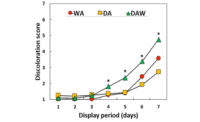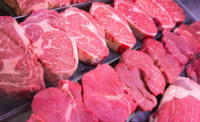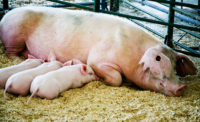Heat stress (HS) is a major problem experienced by the poultry industry in the United States and in tropical countries, as poultry species are more sensitive to heat stress due to feathering and the absence of sweat glands compared with mammalian livestock species. Heat stress has long been known to reduce the productivity of broiler chickens, decreasing breast muscle size and its protein content, as well as damage various tissues including skeletal muscle. This presents an urgent need to develop a practical intervention strategy to prevent the heat stress-induced meat quality problems, such as inferior water-holding capacity (WHC), appearance and/or texture.
Dietary probiotic supplements have been introduced by several research groups as a possible nutraceutical alternative to antibiotics, as probiotics are known to improve gut health and nutrient absorption in broiler chickens. Researchers at Purdue University recently reported that broiler chickens fed a microbial probiotic (Sporulin and/or PoultryStrar) under a stocking density similar to commercial growth environments showed substantial improvements of lipid oxidation stability of breast meat. This is likely due to a possibility that the probiotic supplementation may suppress the generation of reactive oxygen species. With this initial evidence, the Purdue research team conducted a further study to determine the effect of probiotic feeding on oxidative stability and other meat quality attributes (WHC, color and tenderness) of broiler chickens exposed to HS.
In the study, 240 male Ross-708 broiler chickens were assigned to 48 pens in temperature-controlled rooms. Broilers were kept at either 32º C in a HS treatment-room or in a thermoneutral room at 21º C. Two types of diets were given to the broiler chickens: regular diet or probiotic (Sporulin, 250 ppm; Pacific Vet Group-USA, Inc., Fayetteville, Ark.), which contains three strains of Bacillus subtilis. Forty-eight chickens (12 birds/treatment) were harvested at day 46. At one day postmortem, paired breast muscles (M. pectoralis) were collected for the meat quality analyses such as drip and cooking loss, Warner-Bratzler shear force and meat color. To assess lipid oxidation, 2-thiobarbituric acid reactive substances (TBARS), phospholipid, and 2,2-diphenylpicrylhydrazyl (DPPH) were measured.
The results showed that increased hue angle (indication of discoloration) and CIE b* (yellowness) during a retail display, while probiotic feeding decreased hue angle (P = 0.03) and CIE b* (P = 0.06) in HS exposed broiler breast muscles. Probiotic feeding also reduced HS-induced increases in lipid oxidation as measured by TBARS assay and phospholipid content in HS exposed broiler breast muscle (P = 0.002 and P = 0.0033, respectively). DPPH radical scavenging activity was increased with heat stress (P < 0.0001), but no significant probiotic feeding impact was found. Neither HS nor probiotic had significant impacts on WHC and shear force values.
The findings from this study indicate supplementation of dietary probiotics (Sporulin) to broiler chickens mitigates HS-induced oxidative quality defects such as discoloration and decreased lipid oxidative stability, thus improving breast meat quality. These observations suggest probiotic supplementation could be a practical nutraceutical strategy to improve meat quality for the broiler industry, especially in the tropical and subtropical regions. NP
1Department of Animal Sciences, Purdue University, West Lafayette IN 47907; 2Livestock Behavior Research Unit, USDA-ARS, West Lafayette, IN 47907. Yufan Chao is a student at Purdue University and placed 1st the Undergraduate Research Competition at the American Meat Science Association’s 70th RMC in College Station, Texas, in June of 2017. Corresponding author: bradkim@purdue.edu.
References:
- Ashraf, S., Zaneb, H., Yousaf, M. S., Ijaz, A., Sohail, M. U., Muti, S., Usman, M. M., Ijaz, S., and Rehman, H. (2013). Effects of dietary supplementation of prebiotics and probiotics on intestinal microarchitecture in broilers reared under cyclic heat stress. Journal of Animal Physiology and Animal Nutrition, 97, 68-73.
- Azad, K. M., Kikusato, M., Hoque, A. M., and Toyomizu, M. (2010). Effect of chronic heat stress on performance and oxidative damage in different strains of chickens. Journal of Poultry Science, 47, 333-337.
- Ghoneim M.A. and Moselhy, S.S. (2016). Antioxidant status and hormonal profile reflected by experimental feeding of probiotics. Toxicology and industrial health, 32, 741-750.
- Jahromi, M. F., Altaher, Y. W., Shokryazdan, P., Ebrahimi, R., Ebrahimi, M., Idrus, Z., Tufarelli, V., and Liang, J. B. (2016). Dietary supplementation of a mixture of Lactobacillus strains enhances performance of broiler chickens raised under heat stress condition. International Journal of Biometeorology, 60, 1099-1110.
- Kim, H. W., Miller, D. K., Yan, F., Wang, W., Cheng, H. W., and Y. H. B. Kim. (2017). Probiotic supplementation and fast freezing to improve quality attributes and oxidation stability of frozen chicken breast muscle. LWT-Food Science and Technology, 75, 34-41.
- Kim, H. W., Yan, F. F., Hu, J. Y., Cheng, H. W., and Kim, Y. H. B. (2016). Effects of probiotics feeding on meat quality of chicken breast during postmortem storage. Poultry Science, 95, 1457-1464.
- St-Pierre, N. R., Cobanov, B., and Schnitkey, G. (2003). Economic losses from heat stress by US livestock industries. Journal of Dairy Science, 86, E52-E77.




Report Abusive Comment